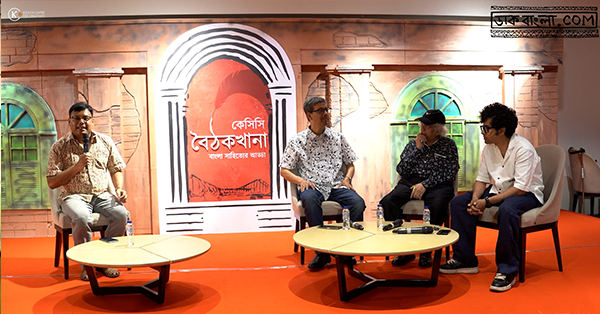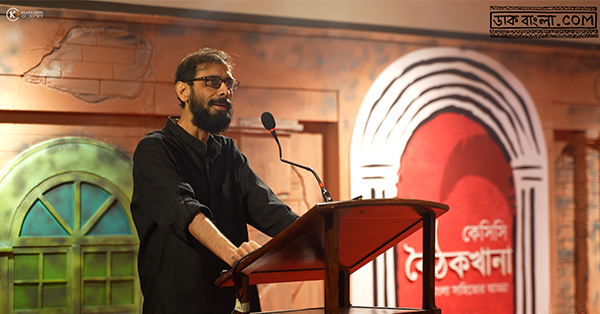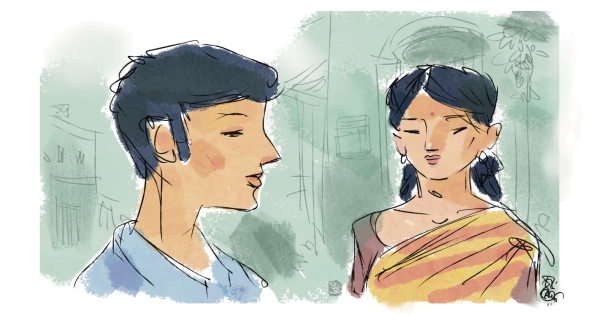জন ফসে এবং ‘সেপ্টোলজি’

 বিষাণ বসু (October 8, 2023)
বিষাণ বসু (October 8, 2023)কিছু কিছু বই এমন হয়, যাদের এককথায় ভাল বা খারাপ বলা যায় না— বা, ভাল-খারাপের বিচারের মধ্যে আনা-ই যায় না— কিন্তু স্রেফ সে বইয়ের পঠনপ্রক্রিয়া বা পঠন-অভিজ্ঞতাটুকুই আপনাকে পাঠক হিসেবে অন্য স্তরে উত্তীর্ণ করার ক্ষমতা রাখে। জন ফসে-র ‘সেপ্টোলজি’ সাতখানা উপন্যাস জুড়ে; হয়তো একটিই লেখা আদতে, তেমনই একখানা বই।
‘পঠন-অভিজ্ঞতাটুকু’ বলছি বটে, কিন্তু, সত্যি বলতে কী, এ বই শেষ করে ওঠা তো চাট্টিখানি ব্যাপার নয়। গত বছর আন্তর্জাতিক বুকার পুরস্কার বা ন্যাশনাল বুক অ্যাওয়ার্ড-এর অন্যতম ফাইনালিস্ট ছিল এই বই— এছাড়া বিভিন্ন পত্রপত্রিকার বিচারে বছরের সেরা বই, এডিটর্স চয়েস ইত্যাদি— একখানা বই নিয়ে এত হইচই দেখে উৎসাহী হয়ে কিনে ফেলেছিলাম বটে, কিন্তু কেনামাত্রই মালুম হয়েছিল, এ বই পড়ে ওঠা দুরূহ। লেখকের নির্মাণশৈলী অতি জটিল, বাক্যগঠন তদনুরূপ। বাক্যই বা বলি কী করে! যতিচিহ্ন যৎসামান্য, অনুচ্ছেদ-বিভাজন প্রায় অনুপস্থিত, কাহিনী-বিন্যাস, যদি থাকে, তার গতি মন্থর এবং খানিক পুনরাবৃত্তি-বহুল। লেখকের নিজের বয়ানেই এ গদ্যধারার নাম slow prose, যা জীবনের মতোই বহমান, তাড়াহুড়োহীন। আনাড়ি পাঠক হিসেবে আমার কাজটা অবশ্য সহজ হয়নি। পড়তে পড়তে পড়ে উঠতে পারিনি, মূলত বাক্যগঠন ও অনুচ্ছেদহীনতার কারণে, ক্লান্তিবশত ছেড়ে দিয়েছিলাম। পরে আবার ফিরে এসেছি, তবু, শেষ করাটা সহজ হয়নি। তারপরও, শেষ করার পর, কোনও জটিল কর্ম সমাধা করতে পারার স্বস্তি নয়, এক আশ্চর্য অভিজ্ঞতা শেষ হয়ে যাওয়ার পরের শূন্যতার অনুভূতি রয়ে গিয়েছে।
সাতটি ছোট উপন্যাস জুড়ে এই ‘সেপ্টোলজি’। কিন্তু প্রকাশিত হয়েছিল একটু অদ্ভুতভাবে— একটি খণ্ডে (The Other Name) প্রথম আর দ্বিতীয় উপন্যাস, দ্বিতীয় খণ্ডে (I is Another) তিন-চার-পাঁচ এবং তৃতীয় খণ্ডে (The Other Name) ষষ্ঠ এবং সপ্তম।
স্মৃতি, মৃত্যু, শিল্পের অর্থ, আমাদের মানুষজীবনের অস্তিত্ব— সব মিলেমিশে একাকার হয়ে থাকা এ উপন্যাসের বিষয়বস্তু নিয়ে কিছু বলতে পারা মুশকিল। তবে রচনাশৈলী সম্পর্কে একটু ধারণা দেওয়া যাক। প্রথম খণ্ডের প্রথম উপন্যাসের একদম শুরুর অংশটা তুলে দিই:
‘And I see myself standing and looking at the picture with the two lines that cross in the middle, one purple line, one brown line, it’s a painting wider than it is high and I see that I’ve painted the lines slowly, the paint is thick, two long wide lines, and they’ve dripped, where the brown line and purple line cross the colours blend beautifully and drip and I’m thinking this isn’t a picture but suddenly the picture is the way it’s supposed to be, it’s done, there’s nothing more to do on it, I think, it’s time to put it away, I don’t want to stand here at the easel any more, I don’t want to look at it any more, I think, and I think today’s Monday and I think I have to put this picture away with the other ones I’m working on but am not done with…’
এবারে ওই খণ্ডেরই দ্বিতীয় উপন্যাসের শুরুর অংশটা:
‘And I see myself standing and looking at two lines that cross, one brown, one purple, and I see how I’ve painted the lines slowly, with a lot of paint, thick paint, two long wide lines, and they’ve dripped, and where the lines cross the colours blend beautifully and drip and I’m thinking that this isn’t a picture but suddenly the picture is the way it’s supposed to be, it’s done, and then I step a little way back from the picture and I stand and look at it and then I see myself lying in the bed at The Country Inn and I think it’s Tuesday today, only Tuesday, and I might as well get up…’
দ্বিতীয় খণ্ডের শুরুতেই তৃতীয় উপন্যাস শুরু হয় এভাবে :
‘And I see myself standing and looking at the picture with the two lines, a purple line and a brown line, that cross in the middle and I think that it’s cold in the main room, and that it’s too early to get up, it doesn’t matter what time it is, so why did I get up then? I think and I turn off the light in the main room and I go back to the little bedroom and I turn off the light there and I lie back down in bed and I tuck the duvet tight around me and Bragi lies down against me and I think well I got a little sleep last night, even if not that much, and today is Wednesday and it’s still early in the morning, or maybe it’s still nighttime?’
চতুর্থ উপন্যাসের শুরু :
‘And I see myself standing and looking at the picture with the two lines that cross near the middle, one brown and one purple, and I see that I’ve painted the lines slowly, with a lot of thick oil paint, and the paint has run, and where the brown line and the purple line cross the colours have blended nicely and dripped down and I think that I have to get rid of this picture, but I want to keep it? anyway I don’t want Åsleik to get it, I think and I think I’ll carry the picture upstairs to the attic and into the storeroom on the left and put it with the other pictures I keep in boxes there, the other paintings I don’t want to sell.’
পঞ্চম উপন্যাসের শুরুও প্রায় একইভাবে। তৃতীয় খণ্ডে ষষ্ঠ উপন্যাসের শুরুতেও আলাদা করে চমক নেই :
‘And I see myself standing there looking at the two lines that cross in the middle, one brown and one purple, and I see that I’ve painted the lines slowly, with a lot of thick oil paint, and the paint has run, and where the brown and purple lines cross the colours have blended beautifully and I think that I can’t look at this picture anymore, it’s been sitting on the easel for a long time now, a couple of weeks maybe, so now I have to either paint over it in white or else put it up in the attic, in the crates where I keep the pictures I don’t want to sell, but I’ve already thought that thought day after day, I think and then I take hold of the stretcher and let go of it again and I realize that I, who have spent my whole life painting, oil paint on canvas, yes, ever since I was a boy, I don’t want to paint anymore…’
তো মনে করিয়ে দেওয়া যাক, সুধী পাঠিকা, এই দীর্ঘ উদ্ধৃতিসমূহের উদ্দেশ্য আপনার বিরক্তি উৎপাদন নয়। উদ্দেশ্য, লেখকের পুনরাবৃত্তি-প্রবণতা, আপাতদৃষ্টিতে— কিন্তু নিবিষ্ট পাঠে ধরা পড়ে যায়, পুনরাবৃত্তির মধ্যে ছোট ছোট মোচড়ে নতুন উপাদান কেমন করে প্রবেশ করানো হয়েছে— এই দ্রুতির যুগে, কোনও রকম হাঁকপাঁক ছাড়াই, লেখক নিজের ছন্দে কেমন করে নিজের সময়ক্রম সৃষ্টি করে নিজের কাহিনী শোনাতে পারলেন বা শোনাতে চাওয়ার দুঃসাহস অর্জন করতে পেরেছেন, এত উদ্ধৃতির উদ্দেশ্য স্রেফ সেটুকুর প্রতি দৃষ্টি আকর্ষণ করা।
স্রেফ সেটুকু! আমার তরফে এই ‘সেটুকু’ শব্দটি ব্যবহার করা খুব সহজ হলেও লেখকের তরফে এ তো বড় কম উচ্চাকাঙ্ক্ষা নয়।
ফসে বলেছেন, ‘আমার ভয় ছিল, সেপ্টোলজি শেষ করার আগে যদি মরে যাই! আমার কিছু বলার প্রয়োজন ছিল, আর অনুভব করছিলাম, বলে যেতে পারাটা আমার দায়িত্বের মধ্যে পড়ে।’
গতকাল জন ফসে-র সাহিত্যে নোবেল পুরস্কার জেতার খবর জেনে ইন্টারনেট সার্চ করছিলাম। চার বছর আগেকার একখানা সাক্ষাৎকার চোখে পড়ল। ফসে বলেছেন, ‘আমার ভয় ছিল, সেপ্টোলজি শেষ করার আগে যদি মরে যাই! আমার কিছু বলার প্রয়োজন ছিল, আর অনুভব করছিলাম, বলে যেতে পারাটা আমার দায়িত্বের মধ্যে পড়ে।’
তো সেই কথাটা বা কথাগুলো, লেখক যে নিজের নিয়ম মেনে, নিজের গতিতে, নিজের ছন্দে, একেবারে নিজের মতো করে বলবেন তাতে বিস্মিত হওয়ার কারণ আছে কি!
জন ফসে নরওয়ের মানুষ। ইউরোপীয় সাহিত্যে তিনি এক বিশিষ্ট নাম— যদিও গতকাল নোবেল পুরস্কার পাওয়ার খবরের পর বুঝলাম, এ পাড়ায়, এমনকী সিরিয়াস পাঠকদের মধ্যেও তাঁর নামটি বেশ অপরিচিত। অথচ, গ্র্যান্ড হোটেলের নিচে বাবুদার দোকানে (ফরেন পাবলিশার্স) ফসে-র বই গত দু-তিন বছর ধরেই মেলে। আসলে ইংরেজিতে তাঁর গদ্যের অনুবাদ খুব পুরোনো ঘটনা নয়, এই বছর পাঁচ-সাত; তার আগে, ইউরোপের দেশগুলোতে— স্ক্যান্ডিনেভিয়ার বাইরে ফ্রান্স বা জার্মানিতে— তাঁর খ্যাতি মূলত নাট্যকার হিসেবে। ‘সেপ্টোলজি’ পড়তে গিয়ে আমার মনে হয়েছে, ইংরেজি ভাষাভাষী মহলে তাঁর খ্যাতির পিছনে অনুবাদক ড্যামিওন সেয়ার্লস-এর অবদানও কম নয়। এমন গদ্য অনুবাদে ধরতে পারা তো সহজ কাজ নয়।
নাট্যকার হিসেবে খ্যাতিমান হলেও, শুরুতে তিনি নাটক লিখতে চাননি। গল্প-উপন্যাস লেখার দশ বছর বাদে, খানিকটা উপরোধে ঢেঁকি গেলার মতো করেই, তিনি নাটক লিখতে শুরু করেন এবং বিপুল সাফল্য পান। নাটকের সাফল্যের সঙ্গে সঙ্গেই আসতে থাকে আরও নাটক লেখার অনুরোধ এবং বাড়তে থাকে খ্যাতি। শেষমেশ পঞ্চাশ বছরে পৌঁছে তিনি সিদ্ধান্ত নেন, আর নাটক লিখবেন না (যদিও পরে তিনি নাটক লেখেছেন এবং এও জানিয়েছেন, ভবিষ্যতে হয়ত আবারও নাটক লিখবেন)। ঠিক যেরকম করে, বেহেড মাতাল অবস্থায়, আচমকা তিনি সিদ্ধান্ত নেন ২০১২ সালে, যে, তিনি আর মদ্যপান করবেন না, প্রায় সেরকমভাবেই।
২০১৫ সালে লেখা শুরু হয় ‘সেপ্টোলজি’। একটিই উপন্যাস, সাত ভাগে লেখা, বা সাতখানা উপন্যাস জুড়ে একটাই লেখা। মুখ্য চরিত্র অ্যাসলে। এক বিপত্নীক শিল্পী। তার বন্ধু মাত্র দুজন— প্রতিবেশী অ্যাসলেক, আর গ্যালারি-মালিক বেয়ার। কাছের শহরেই থাকে আরেক অ্যাসলে, সে-ও শিল্পী। দুজন অ্যাসলে, দুরকম তাদের বাস্তবতা— তাদের অতীত, শৈশব-কৈশোর, তাদের স্মৃতি— আবার হয়তো একই মানুষের দু’রকম অস্তিত্ব। আবারও বলি, এই উপন্যাসের কাহিনী— যদি সেরকম বলার মতো কিছু কাহিনী থাকে— তা গুছিয়ে বলতে পারা মুশকিল।
ফসে-কে তুলনা করা হয় স্যামুয়েল বেকেট আর হেনরিক ইবসেন-এর সঙ্গে। আমি সাহিত্যের ছাত্র নই, সাহিত্যবোধ আমার সীমিত, সাহিত্য-সমালোচনা তো একেবারেই আমার ক্ষমতার বাইরে। জন ফসে কেন অসামান্য— বা তাঁর সাহিত্য ঠিক কোন জায়গায় এই সময়ে দাঁড়িয়ে অস্তিত্বের এক অজানা দিকে আলো ফেলে, সেসব বোঝাতে পারা (বা বুঝতে পারা-ও) আমার পক্ষে অসম্ভব। তাঁর অন্য কোনও বই-ই আমি পড়িনি। ‘সেপ্টোলজি’ পড়াটাও, আগেই বলেছি, আমার পক্ষে খানিক আকস্মিক, এবং পড়ে ফেলাটা সহজ হয়নি।
কিন্তু, এ-ও বলি, এই বই দীর্ঘ প্রয়াসে শেষ করতে পারার পরে বুঝেছি, এই বইয়ের রেশ, ঘোর আমাকে আচ্ছন্ন করে রেখেছে এখনও। রাখবেও। হয়তো, আমৃত্যু।
ফসে বলেছিলেন, ‘আমার কাছে, লেখাটা একরকমের শোনা-ও। আমি ঠিক জানি না যে আমি কী শুনছি, কিন্তু আমি শুনি।’
গাঢ় অবগাহনের এই উপন্যাস পড়তে পড়তে চমক জাগে, ফসে হয়তো আমাকে-ই শুনেছেন!পূর্ববর্তী লেখা পরবর্তী লেখা
Rate us on Google Rate us on FaceBook





